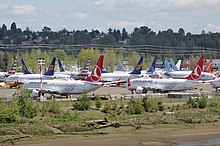
Back حظر طيران بوينغ 737 ماكس 2019 Arabic Suspensió de vol del Boeing 737 MAX Catalan Suspensión de vuelo del Boeing 737 MAX Spanish Suspension de vol du Boeing 737 Max French Larangan terbang Boeing 737 MAX 2019 ID Interdizione al volo del Boeing 737 MAX Italian ボーイング737 MAXにおける飛行トラブル Japanese 보잉 737 MAX의 이륙 금지 조치 Korean Penggantungan Boeing 737 MAX 2019 Malay Aterramento do Boeing 737 MAX Portuguese
 A parking lot at Boeing Field in Seattle, Washington, filled with undelivered Boeing 737 MAX aircraft during the grounding | |
| Date |
|
|---|---|
| Duration |
|
| Cause |
|
| Budget | |
| Deaths | 346 total:
|
| This article is part of a series about the Boeing 737 MAX |
|---|
|
Accidents
|
The Boeing 737 MAX passenger airliner was grounded worldwide between March 2019 and December 2020 – longer in many jurisdictions – after 346 people died in two similar crashes in less than five months: Lion Air Flight 610 on October 29, 2018, and Ethiopian Airlines Flight 302 on March 10, 2019. The Federal Aviation Administration initially affirmed the MAX's continued airworthiness, claiming to have insufficient evidence of accident similarities.[3] By March 13, the FAA followed behind 51 concerned regulators in deciding to ground the aircraft.[4] All 387 aircraft delivered to airlines were grounded by March 18.
In 2016, the FAA approved Boeing's request to remove references to a new Maneuvering Characteristics Augmentation System (MCAS) from the flight manual. In November 2018, after the Lion Air accident, Boeing instructed pilots to take corrective action in case of a malfunction in which the airplane entered a series of automated nosedives. Boeing avoided revealing the existence of MCAS until pilots requested further explanation. In December 2018, the FAA privately predicted that MCAS could cause 15 crashes over 30 years. In April 2019, the Ethiopian preliminary report stated that the crew had attempted the recommended recovery procedure, and Boeing confirmed that MCAS had activated in both accidents.[5]
FAA certification of the MAX was subsequently investigated by the U.S. Congress and multiple U.S. government agencies, including the Transportation Department, FBI, NTSB, Inspector General and special panels. Engineering reviews uncovered other design problems, unrelated to MCAS, in the flight computers and cockpit displays. The Indonesian NTSC and the Ethiopian ECAA both attributed the crashes to faulty aircraft design and other factors, including maintenance and flight crew actions. Lawmakers investigated Boeing's incentives to minimize training for the new aircraft.[6] The FAA revoked Boeing's authority to issue airworthiness certificates for individual MAX airplanes and fined Boeing for exerting "undue pressure" on its designated aircraft inspectors.
In August 2020, the FAA published requirements for fixing each aircraft and improving pilot training. On November 18, 2020, the FAA ended the 20-month grounding, the longest ever of a U.S. airliner. The accidents and grounding cost Boeing an estimated $20 billion in fines, compensation, and legal fees, with indirect losses of more than $60 billion from 1,200 cancelled orders.[7][2][8] The MAX resumed commercial flights in the U.S. in December 2020, and was recertified in Europe and Canada by January 2021.[9]
In January 2024, the FAA grounded some 171 Boeing 737 MAX 9s with a configuration similar to that of Alaska Airlines Flight 1282, which suffered a mid-flight blowout of a plug filling an unused emergency exit on January 5, 2024, causing rapid decompression of the aircraft. The Department of Justice believes Boeing might have violated its January 2021 deferred prosecution settlement.[10] [11]
- ^ Cite error: The named reference
reuters-20230113was invoked but never defined (see the help page). - ^ a b c Isidore, Chris (November 17, 2020). "Boeing's 737 Max debacle could be the most expensive corporate blunder ever". CNN. Archived from the original on December 21, 2020. Retrieved December 21, 2020.
- ^ Team, Legal (October 24, 2019). "How Did the F.A.A. Allow the Boeing 737 Max to Fly? | Aviation Law". Panish | Shea | Ravipudi LLP. Retrieved May 15, 2024.
- ^ "Editorial: Why was the FAA so late to deplane from Boeing's 737 Max?". Los Angeles Times. March 14, 2019. Archived from the original on July 20, 2021. Retrieved July 20, 2021.
- ^ Paris, Francesca; Romo, Vanessa (April 4, 2019). "Preliminary Crash Report Says Ethiopian Airlines Crew Complied With Procedures". NPR. Archived from the original on March 3, 2021. Retrieved May 28, 2021.
- ^ Shepardson, David; Rucinski, Tracy (October 30, 2019). "U.S. lawmakers question Boeing's $1 mln rebate clause for Southwest 737 MAX orders". Reuters. Archived from the original on February 7, 2021. Retrieved January 28, 2021.
- ^ Cite error: The named reference
CBSnewsMAXorderwas invoked but never defined (see the help page). - ^ Gates, Dominic (November 18, 2020). "Boeing 737 MAX can return to the skies, FAA says". Archived from the original on November 30, 2020. Retrieved November 18, 2020.
- ^ "EU to Clear 737 MAX to Fly in January". The American Machinist. November 23, 2020.
- ^ Perez, Evan (May 14, 2024). "Boeing may be prosecuted after breaking safety agreement that prevented criminal charges for 737 crashes, US DOJ says | CNN Business". CNN. Retrieved May 16, 2024.
- ^ Cite error: The named reference
groundingwas invoked but never defined (see the help page).
© MMXXIII Rich X Search. We shall prevail. All rights reserved. Rich X Search